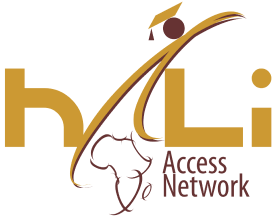For many students, applying for university is a straightforward process: filling out an online form, submitting documents, and sitting for standardized tests. For a student in rural Nanyuki, Kenya, and many other HALI students, something as basic as a reliable internet connection or access to a working computer can be the difference between getting into the university and missing out entirely.
The digital divide, the gap between those with access to modern technology and those without, is not just an inconvenience but a real barrier, one that limits opportunities for HALI students just because they do not have the tools required to compete. With most college applications, SAT prep materials, and scholarship portals now fully online, students without regular access to technology are at a real disadvantage. The shift to digital applications has only widened this gap, making it even harder for HALI students to succeed.
Recognizing how access to technology can shape a student’s journey, Zawadi Africa has made digital equity a key part of their work. Zawadi Africa, a member of the HALI Access Network, has established a computer lab where all of their scholars have unlimited access to the internet and are trained in basic computer skills and digital literacy.
With the majority of college application resources being online – common app, college board, Khan Academy- it is crucial then that we level the playing field for our academically brilliant but financially disadvantaged girls. Moreover, the digitization of SAT exams, which already was disadvantageous for low-income students, emphasizes the need for technological accessibility in order to bridge the gap.
Zawadi goes beyond the basic digital skills through its Capstone Project: Innovate for Impact. This project enables the scholars to conduct full-scale research. The project covers different areas of the digital divide by providing advanced research skills such as data collection, data analysis, and presentation using digital tools. Through this initiative, Zawadi Africa scholars gain hands-on experience in using technology to solve real-world problems while promoting innovation and critical thinking. This preparation ensures that they are just as capable as their peers with better technology access and can compete on equal footing globally.
Zawadi’s values don’t end with individual success. The organization’s initiative “Each one, Teach One” encourages its scholars to give back. A remarkable example of this is TechLit Africa, founded by Zawadi alumna Nelly Cheboi. TechLit Africa (short for Technologically Literate Africa) uses refurbished computers to equip primary school children in rural areas with digital skills, opening up global opportunities.

Nelly’s first school, Zawadi Yetu, was named in recognition of Zawadi Africa’s impact. Today, TechLit Africa provides computer classes to over 10 primary schools in Mogotio and Mombasa, Kenya, reaching more than 4,000 students. Nelly’s work has earned her recognition as CNN Hero of the Year and a spot on Forbes’ 30 Under 30 list.
For a student, learning digital skills is more than just knowing how to use a computer, it is about opening doors that can shape their future. From applying to universities, to managing coursework, and later giving back to their communities, technology supports every part of the journey. When HALI students are equipped with the tools they need, they don’t just catch up, they move forward with confidence. Bridging the digital divide is not only about the internet or devices, it’s about fairness, and giving students from underserved communities a real chance to thrive in today’s world.
